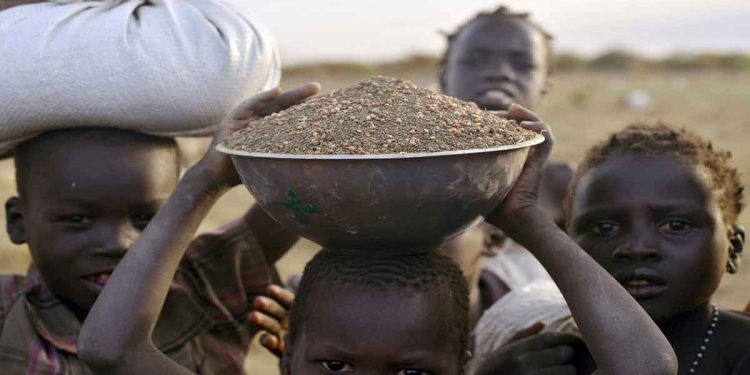A UN spokesman warned that the economic crisis and erratic rainfall are pushing humanitarian needs in Sudan to unprecedented levels, where 18 million people within months face acute food insecurity by September.
The World Food Programme (WFP) and the Food and Agriculture Organization (FAO) expect the number of people in Sudan facing acute food insecurity to nearly double by September, said Farhan Haq, deputy spokesman for UN Secretary-General Antonio Guterres.
Last year, 9.8 million people in Sudan faced acute food insecurity, he said. Some 18 million are threatened to be in the category by September.
“Crop and livestock production has dropped by up to half in 14 states across Sudan when compared to the last five-year average,” Haq said. “The domestic cereal production can only cover the needs of less than two-thirds of the population, leaving many reliant on humanitarian food assistance.”
He cited the Ukraine conflict as causing further spikes in food prices. The price of wheat skyrocketed by 180 percent compared to the same period last year.
“Our partners are appealing for more than 1.9 billion U.S. dollars to help 14.3 million people in Sudan this year,” the spokesman told a regular briefing. “To date, the plan is 9 percent funded.”
Haq said humanitarian partners of the world body were able to reach more than 8.1 million people with life-saving assistance, including food, livelihood, clean water, and healthcare, despite limited funding.
14 million Individuals Need Humanitarian Aid in Sudan
The United Nations Office of Humanitarian Affairs has earlier stated that about 14.3 million people in Sudan will need humanitarian aid in 2022.
It added on its statement issued on Monday, December 6, that according to partners estimations around 14.3 million people -30 percent of Sudan’s population-will need humanitarian aid in 2022, eight million more than 2021, the highest in a decade.
“Two years after Sudan embarked on a path of political transition, and one year after the Juba Peace Agreement, humanitarian needs continued to grow across the country,” the statement added.
It emphasised that these humanitarian aids have resulted from an economic crisis exacerbated by the emerging coronavirus, protracted internal displacement, insecurity, and violence in parts of the country, in addition to floods and diseases outbreak.
Since 25 October, Sudan has been suffering a profound crisis, after the Commander-in-Chief of the armed forces, Abdel Fattah al-Burhan, dissolved the Sovereign Council and declared a state of emergency.
Numerous ministers and governors were dismissed, and a number of party leaders and officials were arrested. Protests began immediately, in response to what many viewed as a “military coup”.






























